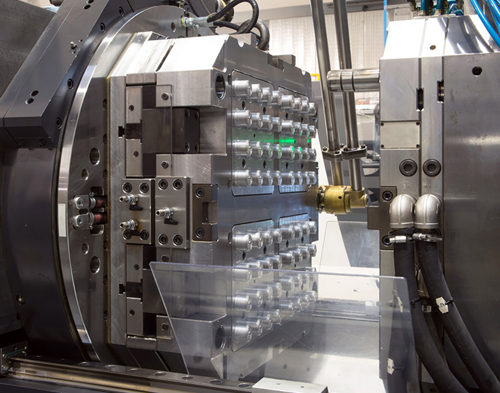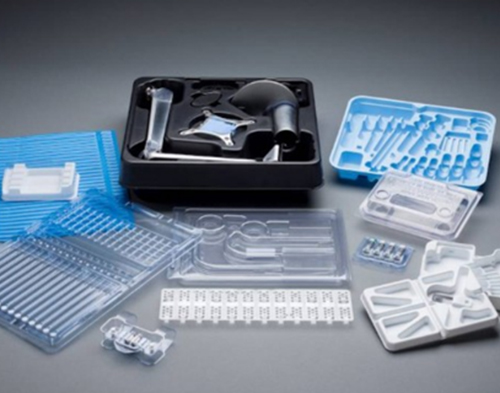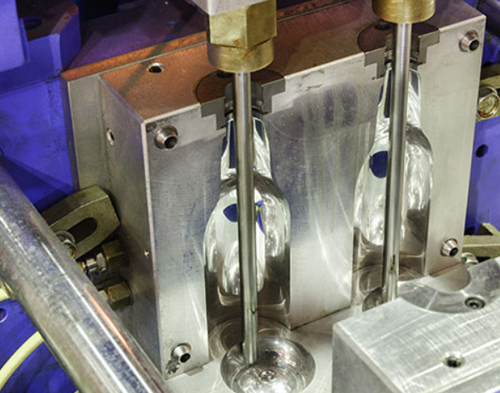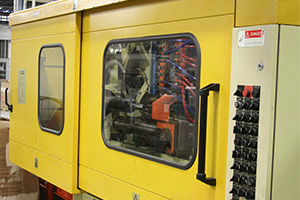
Injection Molding
Success in plastic injection molding is determined by the complex combination of both part and tool design with material selection and process control. At MarCon, our sales and engineering staff are fully prepared to assist in your part design utilizing our CAD software. The proper tool design and construction are integral to our mutual success. Also, using CAD and working with the finest tool makers in the country, we design and build tools for optimum performance and minimal maintenance.
To complement the solid foundation laid for your project, our molding technicians are thoroughly trained on the use of our Husky equipment at Husky's Advanced Manufacturing Center. Additionally, we keep abreast of the latest equipment advances and innovations in processing techniques.
The process may involve a variety of resins, each with certain physical characteristics and/or a variety of colors. Injection molding provides the closest tolerances, or greatest precision, of any plastic conversion process, as well as a higher productivity by the use of molds of multiple cavities.
From initial part design to delivery of your plastic component, we provide the essential tools. These tools complete the formula for success, resulting in exceptional value, which is top quality parts, aggressive pricing and a focus on service.
Specific capabilities for the Plastics Division include:
- Injection molding presses 100-660 tons clamp
- Custom product design
- Material selection
- Mold maintenance
- Automated mechanical assembly
-
Closures
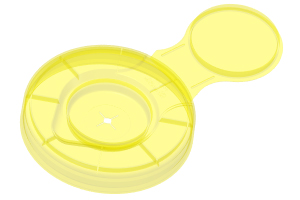
MarCon's domed snap cap lid features include: patented sealing technology, wipe dispensing without cap removal, and custom orifices and colors upon request. Lids are made from PP or LLDPE and come...
-
Canisters
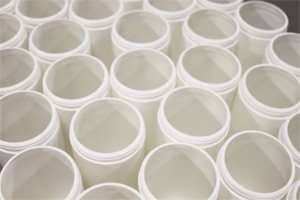
MarCon offers snap cap canisters constructed with HDPE/25% PCR in a variety of sizes compatible with our customizable lids. Snap cap canisters are available in the following sizes: 81mm x 6.2...
-
Freezer Trays
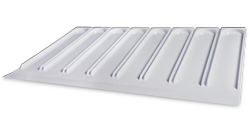
MarCon's Plastics Division manufactures freezer trays in the dimensions noted below. Custom trays will be quoted upon request. Dimensions: 3930 - 7 channel quarts 32.50 x 23.25" 32....
High-Density Polyethylene (HDPE)
HDPE injection molding is a manufacturing process that utilizes High-Density Polyethylene (HDPE) as the raw material to create a wide range of plastic parts and products. The process involves melting HDPE resin, injecting it into a mold cavity, cooling, ejection, and finishing. HDPE's desirable properties, including strength, chemical resistance, and low cost, make it suitable for various applications in industries such as packaging, automotive, consumer goods, and construction. This process allows for the efficient and cost-effective production of plastic parts with diverse shapes and sizes, making it a widely used method in the manufacturing industry.
Low-Density Polyethylene (LDPE)
LDPE injection molding is a manufacturing process that utilizes Low-Density Polyethylene (LDPE) as the primary material to create plastic parts and products. This process involves melting LDPE resin, injecting it into a mold cavity, cooling, ejection, and potential finishing steps. LDPE's notable characteristics, including flexibility, low density, and moisture resistance, make it suitable for applications like flexible packaging, squeeze bottles, toys, and consumer goods. LDPE injection molding is a versatile and cost-effective method for producing plastic parts with pliability and impact resistance, catering to a wide array of shapes and sizes, particularly for applications requiring more flexible materials.
Medium-Density Polyethylene (MDPE)
MDPE injection molding is a manufacturing process that utilizes Medium-Density Polyethylene (MDPE) as the primary material to create plastic parts and products. This process involves melting MDPE resin, injecting it into a mold cavity, cooling, ejection, and possible finishing steps. MDPE is known for its balanced properties, including moderate strength, good chemical resistance, and durability, making it suitable for applications such as pipe fittings and industrial components. MDPE injection molding is a cost-effective and efficient method for producing plastic parts in a wide range of shapes and sizes, meeting the specific requirements of industries where this material's characteristics are essential.
Polypropylene (PP)
Polypropylene injection molding is a manufacturing process that uses polypropylene (PP) as the primary material to produce plastic parts and products. PP is known for its excellent properties, including high chemical resistance, lightweight, and cost-effectiveness, making it widely used in applications across industries. The process involves melting PP resin, injecting it into a mold cavity, cooling, ejection, and potential finishing steps. Polypropylene injection molding is a versatile and cost-effective method for efficiently creating plastic components with a variety of shapes and sizes, making it a popular choice for industries such as packaging, automotive, consumer goods, and medical devices.
Polystyrene (PS)
Polystyrene (PS) injection molding is a manufacturing process that employs polystyrene, a thermoplastic polymer known for its clarity and rigidity, as the primary material to create plastic parts and products. This process involves melting PS resin, injecting it into a mold cavity, cooling, ejection, and potential finishing steps. Polystyrene injection molding is commonly used for applications that require transparency and electrical insulating properties, making it popular in industries like packaging, electronics, and consumer goods. It offers a cost-effective and efficient method for producing plastic components in various shapes and sizes, efficiently meeting the requirements of these applications.
PCR (Post-Consumer Recycled)
PCR, which stands for Post-Consumer Recycled material, pertains to plastic substances recycled from consumer products at the end of their lifecycle, having been disposed of or processed by consumers. These materials are sourced from items like discarded plastic bottles, packaging, and various consumer goods, recovered through recycling procedures. Post-consumer recycled materials play a pivotal role in sustainable and eco-conscious plastic manufacturing, aiding in the reduction of demand for new plastic resins, resource conservation, and minimizing the environmental impact associated with plastic production. PCR materials are employed in crafting novel plastic products, fostering a circular economy, and lessening the overall environmental impact of plastic manufacturing. Recycling programs and initiatives are instrumental in gathering and processing post-consumer plastics to reintegrate them into the manufacturing supply chain, thus diminishing waste and preserving resources.
Post-Consumer Recycled Material (PCR)
PCR, which stands for Post-Consumer Recycled material, pertains to plastic substances recycled from consumer products at the end of their lifecycle, having been disposed of or processed by consumers. These materials are sourced from items like discarded plastic bottles, packaging, and various consumer goods, recovered through recycling procedures. Post-consumer recycled materials play a pivotal role in sustainable and eco-conscious plastic manufacturing, aiding in the reduction of demand for new plastic resins, resource conservation, and minimizing the environmental impact associated with plastic production. PCR materials are employed in crafting novel plastic products, fostering a circular economy, and lessening the overall environmental impact of plastic manufacturing. Recycling programs and initiatives are instrumental in gathering and processing post-consumer plastics to reintegrate them into the manufacturing supply chain, thus diminishing waste and preserving resources.
Other Injection Molding
Custom Colors Available!
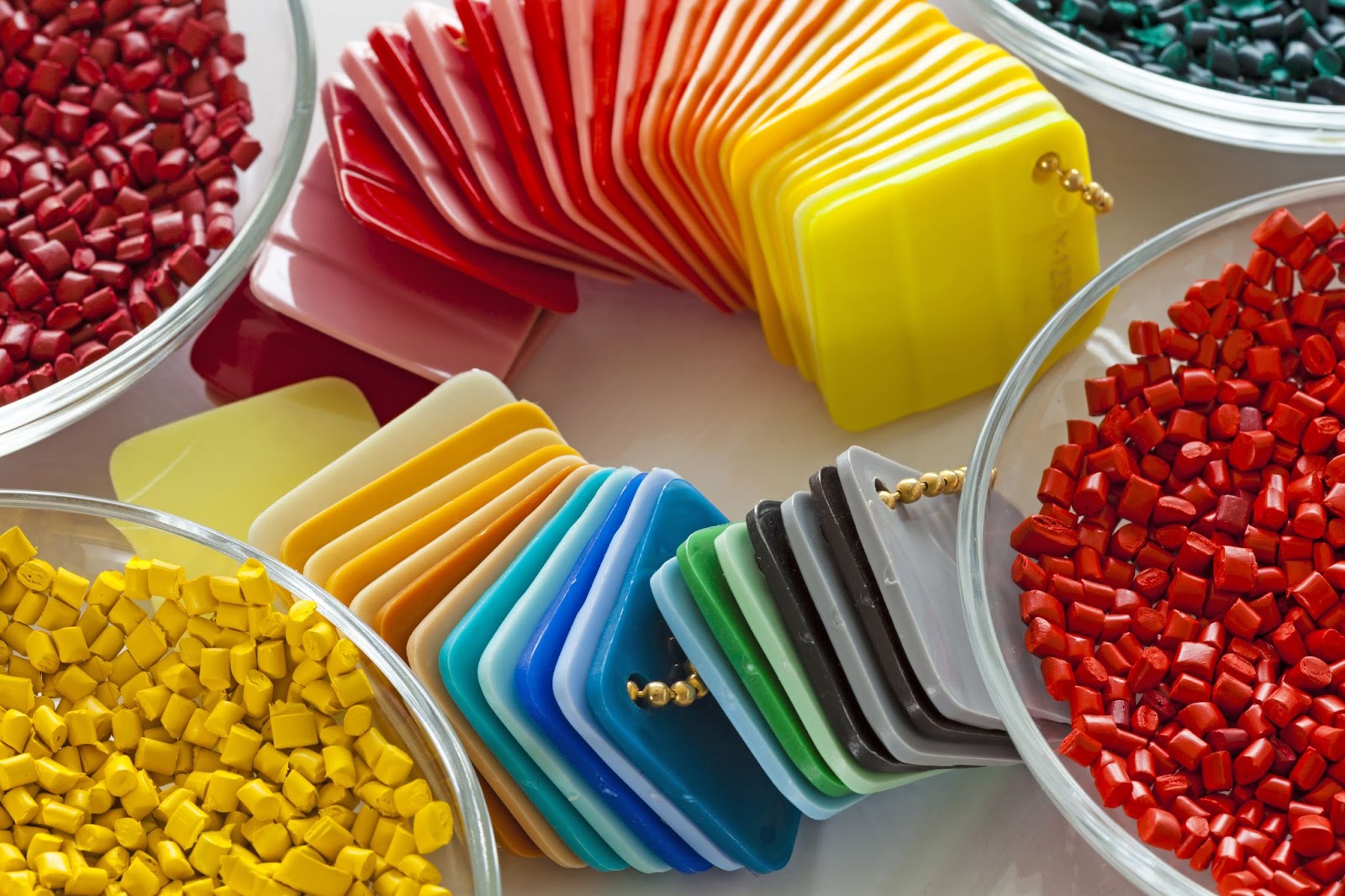
Colors in plastic injection molding are achieved by adding pigments or colorants to the plastic resin before it's melted and injected into the mold. Several methods are used, including masterbatch, pre-blended color pellets, dry color blending, and liquid colorants, each with specific applications. These colorants are mixed with the polymer material in the molding machine's barrel to achieve uniform color distribution. The method chosen depends on factors like the desired color, production scale, and precision requirements to ensure consistent and durable coloration in the final plastic product. Contact us today to learn how we can create the perfect color match for your project!
Quick Navigation
About Equipment Our Services Portfolios Products Plastics and Pop Display Solutions News Contact©2023 MarCon, Inc.® | ALL RIGHTS RESERVED | Industrial Website Catalog by WYSIWYG Marketing


